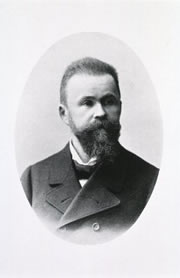This article is part of the series "A Moment in History" where we honor those who have contributed to the growth of medical knowledge in the areas of anatomy, medicine, surgery, and medical research.To search all the articles in this series, click here. |
|
|
Carl Wernicke (1848-1905). German psychiatrist, neurologist, and neurosurgeon, Carl Wernicke was born in 1848 in the town of Tarnowitz, in what was then Prussia. He studied medicine in Breslau, Poland. In 1817 he became an assistant psychiatrist at a Breslau hospital. Fascinated with the discoveries and publications of Paul Broca on localized brain damage and aphasia, Wernicke left his post for a time to work with Theodor Meynert in Vienna. At that time Meynert was considered an authority in neuropsychiatry. In 1874, soon after his return to Breslau, Wernicke published his ideas and findings in aphasia in a revolutionary publication "The Aphasia Symptom Complex". Wernicke was only 26. At the time, the general outlook on brain activity was that the brain worked in localized areas. Carl Wernicke's ideas were that although this was true, the functionality of the brain resided in the connections between the different areas of the brain. His ideas were right. Wernicke described what later would be known as "sensory aphasia" or the eponymic "Wernicke's aphasia". Wernicke was a pioneer in the surgical treatment of hydrocephalus, as well as the surgical treatment of brain abcesses. He published several books, including a brain atlas. Carl Wernicke died as the consequence of a bycicle accident in 1905. Sources: |
 Original image courtesy of |
| Back to MTD Main Page | Subscribe to MTD |